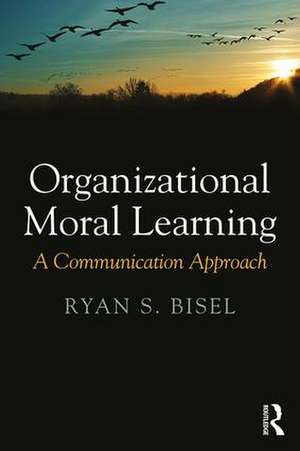Organizational Moral Learning: A Communication Approach
Autor Ryan Biselen Limba Engleză Paperback – 3 aug 2017
Communication Ethics Division's 2018 Single-Author Book of the Year Award
Organizational Communication Division's 2018 Outstanding Book of the Year Award
Extensive work in psychology and neuroscience reveals that individuals are born with moral intuitions, and this volume capitalizes on that recent insight to provide a new perspective on how to lead organizational ethics. Organizational Moral Learning presents communication-based recommendations for managers and leaders to encourage authentic moral dialogue at work so that these discussions can be used to update work practices vigilantly as organizations strive for ethical excellence. Organizational ethics are crucial to individual, organizational, national, and even global well-being, and this work leads a revolution in thinking about how to manage organizational ethics. Written accessibly for students and practitioners alike, this book provides a leading-edge look at organizational ethics based on science and research applicable to a worldwide audience.
| Toate formatele și edițiile | Preț | Express |
|---|---|---|
| Paperback (1) | 412.79 lei 6-8 săpt. | |
| Taylor & Francis – 3 aug 2017 | 412.79 lei 6-8 săpt. | |
| Hardback (1) | 765.01 lei 6-8 săpt. | |
| Taylor & Francis – 10 aug 2017 | 765.01 lei 6-8 săpt. |
Preț: 412.79 lei
Nou
Puncte Express: 619
Preț estimativ în valută:
78.99€ • 82.69$ • 65.36£
78.99€ • 82.69$ • 65.36£
Carte tipărită la comandă
Livrare economică 05-19 aprilie
Preluare comenzi: 021 569.72.76
Specificații
ISBN-13: 9781138119567
ISBN-10: 1138119563
Pagini: 276
Ilustrații: 16
Dimensiuni: 152 x 229 x 20 mm
Greutate: 0.37 kg
Ediția:1
Editura: Taylor & Francis
Colecția Routledge
Locul publicării:Oxford, United Kingdom
ISBN-10: 1138119563
Pagini: 276
Ilustrații: 16
Dimensiuni: 152 x 229 x 20 mm
Greutate: 0.37 kg
Ediția:1
Editura: Taylor & Francis
Colecția Routledge
Locul publicării:Oxford, United Kingdom
Public țintă
UndergraduateCuprins
Chapter 1: Rethinking Organizational Ethics Training
Chapter 2. Moral Intuition: Advances in Moral Psychology and Neuroscience
Chapter 3: The Social Intuitionist Model
Chapter 4: Communication and the New Organizational Ethics
Chapter 5: How Cultur(ing) Works
Chapter 6: Pluralistic Moral Ignorance and Spirals of Silent Misdirection
Chapter 7: Here-and-Now Ethics Talk in the Workplace
Chapter 9: Sensemaking and Identity: What to Expect from Moral Reasoning
Chapter 8: Substituting Here-and-Now Ethics Talk
Chapter 10: Organizational Learning and Organizational Communication
Chapter 11: From Individual Moral Intuition to Organizational Moral Learning
Chapter 12: Organizing for Moral Mindfulness
Chapter 13: Stories of Organizational Moral Learning and Ignorance
Chapter 14: Communication Practices for Managing Moral Mindfulness
References
Chapter 2. Moral Intuition: Advances in Moral Psychology and Neuroscience
Chapter 3: The Social Intuitionist Model
Chapter 4: Communication and the New Organizational Ethics
Chapter 5: How Cultur(ing) Works
Chapter 6: Pluralistic Moral Ignorance and Spirals of Silent Misdirection
Chapter 7: Here-and-Now Ethics Talk in the Workplace
Chapter 9: Sensemaking and Identity: What to Expect from Moral Reasoning
Chapter 8: Substituting Here-and-Now Ethics Talk
Chapter 10: Organizational Learning and Organizational Communication
Chapter 11: From Individual Moral Intuition to Organizational Moral Learning
Chapter 12: Organizing for Moral Mindfulness
Chapter 13: Stories of Organizational Moral Learning and Ignorance
Chapter 14: Communication Practices for Managing Moral Mindfulness
References
Notă biografică
Ryan S. Bisel is an Associate Professor of Organizational Communication at the University of Oklahoma. His research interests focus primarily on issues surrounding leadership communication, organizational culture, and behavioral ethics.
Descriere
Organizational Moral Learning presents communication-based recommendations for managers and leaders to encourage authentic moral dialogue at work so that these discussions can be used to update work practices vigilantly as organizations strive for ethical excellence.
